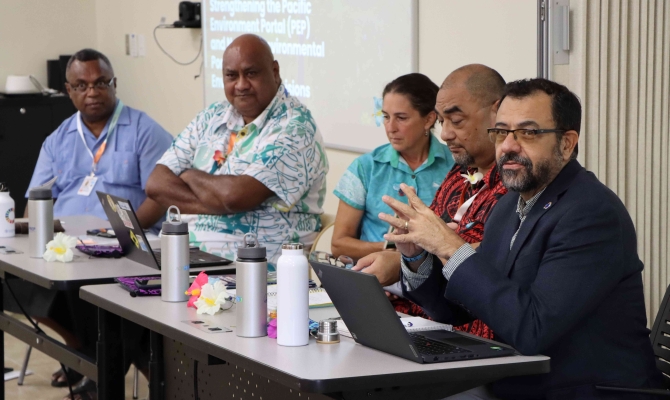Empowering decisions through data, was a sentiment echoed by many at the Fourth International Conference of Small Island Developing States currently being held in Antigua.
“In an era of unprecedented environmental challenges, data is our most valuable asset. It empowers us to make informed decisions, track progress, and implement effective policies tailored to the unique needs of our Pacific communities” said Hu’akavemeiliku Siaosi Sovaleni, Prime Minister of Tonga.
Emphasising its importance, a Pacific-led talanoa on the sidelines of SIDS4 conference highlights the crucial role of data management in fostering sustainable development. Small islands, including countries in the Pacific, face complex environmental and developmental challenges such as climate change, natural disasters, and limited resources.
The importance of robust data systems in these contexts cannot be overstated. Data enables the monitoring of environmental changes, assess risks, and develop tailored policies that enhance resilience and sustainability.
Sefanaia Nawadra, Director General of SPREP in his opening remarks stated “Informed decisions are the heartbeat of regional development. Through data-driven strategies, we can achieve greater cooperation and progress across the Pacific.”
The interactive panel discussion, led by the Secretariat of the Pacific Regional Environment Programme and featuring panellists from the Pacific Community (SPC), Pacific Islands Forum (PIFS), and United Nations Environment Programme (UNEP) showcased the collaborative efforts of regional agencies and partners in building a future where data-driven policies and frameworks foster a resilient Pacific. ‘
The Pacific Community (SPC) has been at the forefront of developing and maintaining comprehensive data systems that support member countries in various sectors, including health, population, agriculture, and climate change through its Pacific Data Hub.
“SPC’s data initiatives aim to enhance the capacity of Pacific nations to collect, analyse, and utilise data effectively. Our goal is to build robust data ecosystems that serve as the foundation for evidence-based policy-making and sustainable development.” said Anne- Claire Goarant, Programme Manager of SPC Climate Change and Environmental Sustainability programme.
The effective management of data not only drives organisational success but also possesses transformative potential when leveraged strategically to craft evidence-based strategies for sustainable development.
Henry Cocker, PIFS Engagement Adviser emphasised the importance of collaboration as a strategic pathways in implementing the 2050 Blue Pacific Strategy stated – “Scientifically based research, innovation and the use of data and information to inform policies and practices are crucial to protect and safeguard the Blue Pacific continent”.
At the heart of environmental conservation in the region lies the need for actionable solutions that are data driven. Without accurate and reliable data, efforts to protect the environment and promote sustainable development are undermined, leading to ineffective policies, and missed opportunities for positive change.
SPREP through its Environmental Monitoring and Governance Programme established the Pacific Environment Portal and the network of national ports to assist member countries to manage, share, and store their environmental datasets. These datasets are useful for the development of national state of environment (SOE) reports.
The SOE reports serve as vital tools for policymakers, scientists, and the public alike, providing a detailed assessment of the health and condition the environment to formulate evidence-based policies and strategies to address environmental issues effectively.
“By compiling data on key indicators such as air and water quality, deforestation rates, species populations, and greenhouse gas emissions, SOE reports offer invaluable insights into environmental trends” said Jope Davetanivalu, SPREP Director of Environmental Monitoring and Governance.
“Robust data collection, analysis, and reporting mechanisms is essential. Governments, international organisations, research institutions, and civil society must collaborate to strengthen data infrastructure and ensure the availability of high-quality data for state of environment reports” he added.
The network of environmental data portals was established as a solution to the challenges of data accessibility and timely availability in the region for the development of environmental policies, as well as national reporting to multilateral environmental obligations such as SDGs. The portals were established through a close collaboration with the United Nationals Environment Programme under the Inform Project.
“UNEP highlights the critical importance of data as the cornerstone of informed action, empowering Pacific nations to navigate towards sustainable futures and safeguard the irreplaceable richness of our oceanic heritage.
As the SIDS4 conference progresses, the unwavering plea for action echoes, emphasising the importance of data-driven solutions as guidance towards a sustainable and resilient future.
The “Strengthening the Pacific Environment Portal (PEP) and National Environment Portal for Better Environment Decisions” special event was held on the margins of the Fourth International Conference on Small Islands Developing States on 29 May 2024.
Presenters on the panel included Sefanaia Nawadra, Director General of SPREP, Anne- Claire Goarant, Programme Manager of SPC Climate Change and Environmental Sustainability programme, Henry Cocker, PIFS Engagement Adviser, and DrChristopher Cox, a Programme Officer with the United Nations Environment Programme.
The Panel was moderated by Jope Davetanivalu, Director of Environmental Governance and Monitoring.
The SIDS4 conference is held from 27 to 30 May 2024.













